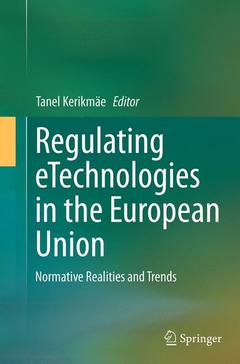Description
Regulating eTechnologies in the European Union, 2014
Normative Realities and Trends
Coordinator: Kerikmäe Tanel
Language: English
Subjects for Regulating eTechnologies in the European Union:
Publication date: 08-2016
Support: Print on demand
Publication date: 07-2014
324 p. · 15.5x23.5 cm · Hardback
Description
/li>Contents
/li>Comment
/li>
The EU strategy 2020 includes ambitious plans for e-regulation that could improve Europe?s competitiveness. However, the European states have very different legal frameworks in this field. This book introduces flagship initiatives and provides a detailed overview and analysis of the current standards and latest developments, offering practical insights and guidelines for practitioners and policy-makers alike. Further, as it discusses the main areas of e-regulation, it can serve as a useful platform for university education in light of the growing need for new kinds of specialists, i.e. IT lawyers. The book concentrates on fields that are directly affected by e-regulation such as cyber-security, databases, computer programs, e-governance, IP and competition law and informatics.
Tanel Kerikmäe, Introduction: E-Regulation in the European Union. Normative realities and trends.- Tanel Kerikmäe and Pawan Dutt, Conceptualization of emerging legal framework of e-regulation in the European Union.- Katrin Nyman Metcalf, e-Governance in law and by law. The legal framework of e-governance.- Ülle Madise and PriitVinkel, Internet voting in Estonia: From constitutional debate to evaluation of experience over six elections.- Addi Rull, Ermo Täks, and Alex Norta, Towards software-agent enhanced privacy protection.- Johan Axhamn, Striking a fair balance between the protection of creative content and the need to foster its dissemination: The challenges posed by internet linking and meta search engines.- Mari Männiko, Intermediary service providers’ liability exemptions - Where can we draw the line?.- Kristi Joamets, Civil status registration – More than data collection. EU digital development in promoting the free movement of civil status document.- Agnes Kasper, The fragmented securitization of cyberthreats.- Agnes Kasper, Legal aspects of cyber security in emerging technologies – Smart grids and big data. European answers to security breaches and „common“ cybercrime.- Edita Gruodytė and Mindaugas Bilius, Investigating cybercrimes: Theoretical and practical issues.- Maria Claudia Solarte-Vasquez, Reflections on the concrete application of principles of internet governance and the networked information society in the European Union institutionalization process of Alternative Dispute Resolution methods.- Pawan Kumar Dutt and Tanel Kerikmäe, Concepts and problems associated with eDemocracy.
These books may interest you

European State Aid LawA Commentary 444.75 €



